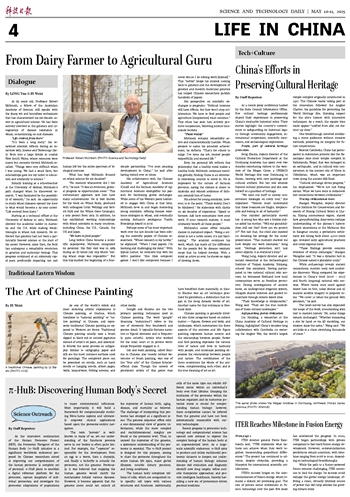
π-HuB: Discovering Human Body's Secret
As the innovative continuation of the Human Proteome Project (HPP), the Proteomic Navigator of the Human Body (π-HuB) initiative is a significant worldwide endeavour proposed by Chinese researchers aimed at improving our comprehension of the human proteome (a complete set of proteins). π-HuB plans to establish a digital reference platform for the proteome, capture snapshots of individual proteomes, and investigate the proteomic adaptations of populations to major environmental influences. Most importantly, it will build a framework for computationally modeling Meta-homo sapiens and ultimately empower clinical applications based upon the proteome-centric navigation.
The term "protein" is well-known to many of us, yet our understanding of the functions proteins serve in our bodies is often quite limited. For example, the “operator" responsible for the development from an egg to a worm, then a chrysalis, and finally a butterfly is actually the proteome, not the genome. Previously, it was believed that mapping the human genome would clarify the mechanisms behind various diseases. However, it became apparent that the genome alone could not unlock all the mysteries of human birth, aging, disease, and mortality as believed. The challenge of interpreting this proteome has emerged as a significant issue. The genome sequence offers only a one-dimensional view of genetic information, while the more complex and multidimensional insights are found at the proteome level. Thus, to unravel the mysteries of the genome, a systematic understanding of the proteome is essential. The π-HuB project is designed for this purpose, aiming to chart the proteome throughout the entire human life span, major global illnesses, notable dietary practices, and living conditions.
The human body comprises trillions of cells, which are categorized into specific cell types with various structures and functions. Additionally, cells of the same type can exhibit different states within an individual's body over their lifetime. Grasping the intricacies of the proteome within the human organism and its numerous potential states is crucial for comprehending human biology; however, these complexities cannot be inferred from the genome and have not been systematically measurable with current technologies.
Recent progress in proteomic technology and computational science has opened new avenues to explore the complex biology of the human body at an unprecedented level. As a large-scale scientific endeavour, π-HuB aims to produce and utilize multimodal proteomic datasets to deepen our understanding of human biology; enhance disease risk evaluation and diagnosis; identify new drug targets; refine suitable therapeutic approaches; and provide intelligent healthcare, thereby heralding a new era of proteomics-driven practical medicine.







